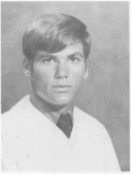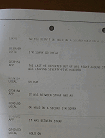|
On September 8, 1985, at 9:21 p.m. James Bailey and his friend departed
Fort Lauderdale, Florida, in his Cherokee N5488W, bound for Key West. The weather
was fair, the flight plan VFR (Visual Flight Rules) mostly over land and the island
studded and shallow Florida Bay. Everything went well in the flight. Then about
20 miles away from his destination, he routinely contacted Key West.
Bailey: "Key West Approach N five four eight eight Whiskey"
Approach: "Five Four Eight Eight Whiskey Navy Key West Approach Key
West was last active runway niner wind variable zero six zero zero
nine zero at one zero altimeter three zero zero two."
Bailey: "Eight Eight Whiskey, Roger, ah, can you give me a
destination from Key West, sir." 
He stated he was beginning his descent from
7,700 feet.
James Bailey, 1971. He was 32 at the time of his disappearance.
The following thumbnails contain the rest of the
dialogue during which time N5488W must have vanished.
Although many planes vanish on long routes, those that
have vanished while on radar give a chilling example of how
swift disappearances are, making them a total contrast to crashes, which often follow pilots reporting some trouble. Crashes also leave debris, but disappearances do not. This case is unique in that it shows how sudden is the mysterious cause, and also shows the first reactions of those who have the only eye on the Bermuda Triangleó radar controllers.
Note: the other "N" numbers are different aircraft in routine contact with the tower.
The thumbnails follow:
    
That's about all there was to it. Radar controllers who are used to any number of problems were at a loss. When the plane failed to arrive, a complete search was started. Nothing was found and "results negative" were once again posted along with the very familiar and Spartan "aircraft damage and injury index presumed."
Satellite imagery was referred to in order to calculate the intensity and locality of that thunderstorm. It turned out to be a very local thunderstorm, with the usual brief tropical lightning and rumbling. It would have been easy for Bailey to fly around it. In fact, at Key West, about 10 minutes away, it was clear with mild winds.
It is the stereotypical campfire myth come to reality. From radarís perspective, Bailey flew into a cloud and never emerged.
Was he simply that inexperienced a pilot? He was 32 years old and only flying for about a year. He was still flying under his first certificate, and was actually in violation by carrying a passenger. Flying along the edge of the storm, did he encounter deadly wind shear? It is worse on the edge of a storm than most people realize.
Whatever happened, it did so suddenly, without warning, and without affording Bailey the chance to shout anything, no matter how terse, into the microphone; and it effectively wiped the Cherokee off the face of the earth.
|
